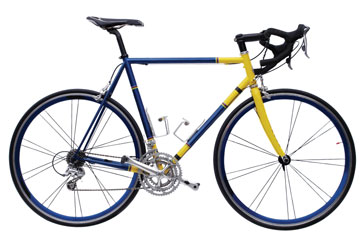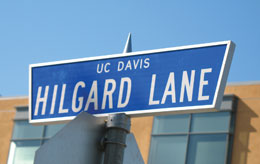Volume 26 · Number 2 · Winter 2009

End Notes
Squirrel Birth Control
In recent years, UC Davis has been overrun by cute but increasingly pesky invaders — non-native tree squirrels.
The eastern fox squirrels (Sciurus niger) eat the bark of redwood trees in the arboretum, sometimes enter buildings, like to gnaw on electrical wires, compete with native squirrels and birds for acorns and other food, could damage research crops and orchards, and might bite or scratch people.
What’s a research university to do? The answer from UC Davis: Launch a study in squirrel birth control.
“In seven years, we went from having no eastern fox squirrels on the campus to having more than 400, and there is currently no sign that their reproduction is slowing down,” said Sara Krause, an ecology doctoral student leading the project.
In October, Krause and other researchers began capturing squirrels with humane live traps, marking them with a nontoxic dye and setting them free. Through the winter, the researchers will study the squirrels’ behavior to establish a baseline understanding of the animals’ normal activities.
Next summer, the squirrels will be recaptured, and some will be given hormone injections to stop them from having offspring. Other animals will be given a placebo injection (sterile saline) and will serve as scientific controls for comparison.
If all goes well, the population of non-native tree squirrels living at UC Davis will plateau and then, in five to 10 years, decline to a small, sustainable number, with no harm to the animals. To watch an online video feature, click here.

Put the Pedal to Your Mettle for This Cycle Quiz
UC Davis has so many bicycles that some people think the campus mascot ought to have two wheels and a U-lock. With bicycles on our minds, we created a bicycle quiz to test your knowledge of UC Davis’ bike culture.
We feature the first couple of questions here. Click here for answers and the rest of the quiz.
1. UC Davis briefly held what bicycle-related Guinness World Record?
a. World’s only pedal-powered desk
b. Human-powered vehicle land-speed record
c. Largest bicycle auction
d. Largest bicycle parade
2. Which faculty member is credited with spearheading the city of Davis’ bike lane movement, after being inspired by European bike lanes?
a. Emil Mrak, chancellor and professor of food science
and technology
b. Frank Child, professor of economics
c. Robert Sommer, professor of psychology
d. Dale Lott, professor of wildlife, fish and
conservation biology
— Amy Rafferty
In, Out or Illusion?
Great news for those who always question a referee’s call during a tennis match: You might not be so crazy after all.
New research, led by David Whitney, associate professor at the Center for Mind and Brain and the Department of Psychology, shows that professional tennis referees are vulnerable to an optical illusion when they see balls bouncing on or close to a line. The common flaw in the visual system — also known as a “perceptual bias” — has rarely been documented in sports.
The error occurs because our brain’s perception of the world lags a few milliseconds behind reality. While the brain is processing the image of a moving object received from your eyes, the object has already moved on. To compensate, your brain estimates where the object should go next, based on its speed and direction of travel. Because of this, Whitney says that referees tend to over-call shots as out.

A mooving address
Bye-bye, Beau Vine Lane. Hello, Hilgard Lane.
One of UC Davis’ shortest new streets has traded in its punny name to honor a giant in the history of agricultural science, Eugene Hilgard.
The lane skirts the eastern edge of the new Robert Mondavi Institute for Wine and Food Science, where viticulture and enology and food science faculty members backed the name change. As dean of the College of Agriculture at Berkeley in 1875–1905, Hilgard established the viticulture program, and food science grew out of that.
Beau Vine Lane had been picked by campus planners as a temporary name when the road was first constructed, said John Meyer, vice chancellor for resource management and planning.
Bovine lovers can take heart though. Meyer said the campus’s future West Village neighborhood might gain a Beau Vine Lane.
